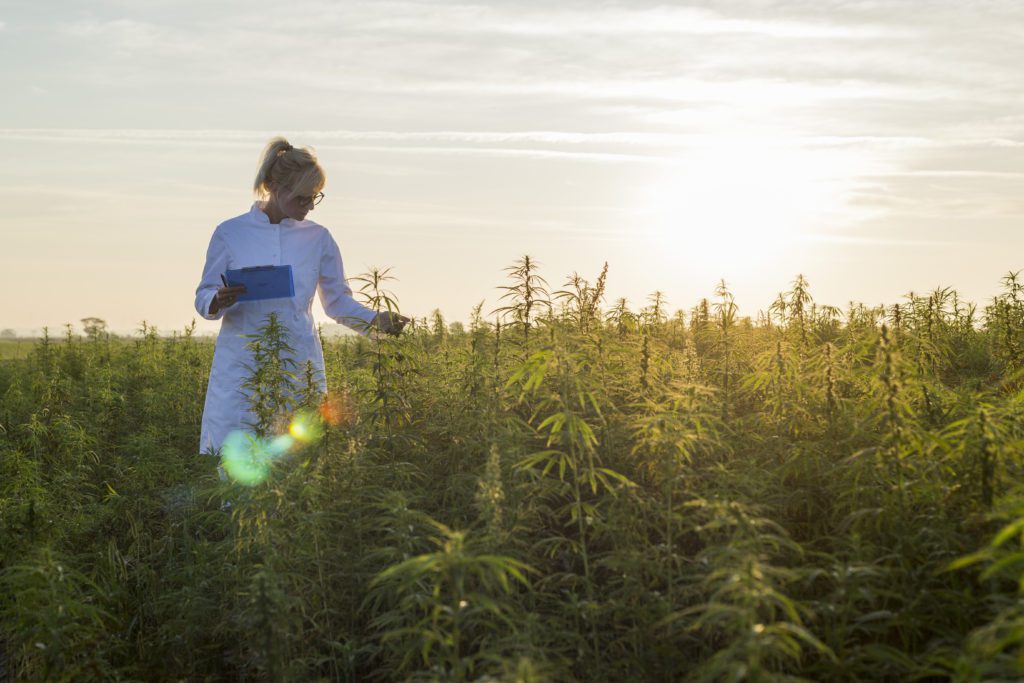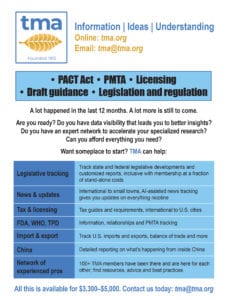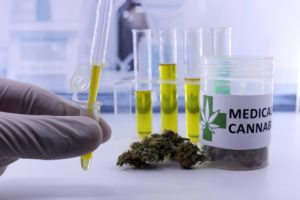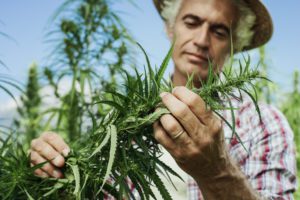
International cannabis attorney Rod Kight discusses minor cannabinoids and the growing cannabis market.
By Timothy S. Donahue
The questions kept coming. When Vapor Voice published an article on Delta-8 THC and other minor THC products in its last issue (see “High Expectations,” Vapor Voice, issue 3, 2021), it seems readers had more questions concerning newly marketed cannabinoids than the story answered. To gain more insight into the state of the current overall global cannabis market, we went to one of the best resources in the business.
In the cannabis industry, there may be no attorney more renowned than Rod Kight. While his firm is based in Asheville, North Carolina, USA, Kight currently spends much of his time in Mexico. His experiences with marijuana started when he used it during chemotherapy treatments in 2011. It had such a positive impact on his recovery that he decided he was going to focus on cannabis law. He wanted others to have the access that offered him such a profound experience.
“It’s kind of funny because I was practicing in North Carolina, which is a prohibition state. I got licensed in Oregon and kind of dove head-in to the laws regarding cannabis. It was right around the time that the 2014 Farm Bill came out that legalized, at the federal level, cannabis for the first time in almost a century,” Kight said. “We started getting calls about CBD. And like any good lawyer, I thought I would do some research and see what the laws and regulations were concerning CBD.”
He did not find much. He said he found nothing on CBD derived from hemp. The only federal restrictions on cannabinoids were centered on the source of the product. If the cannabinoids are derived from marijuana, then they are illegal controlled substances because marijuana is defined as the plant and all its parts. The legal definition is so broad that technically speaking, chlorophyll from a marijuana plant is a controlled substance.
Anything derived from a hemp plant, however, is legal, provided it has less than 0.3 percent Delta-9 THC. “All of the hemp plant’s parts are legal. So, if you get CBD or another cannabinoid from hemp, then it is not a controlled substance. I carved that out and began writing about it,” Kight explained. “We started to get more and more calls, more and more clients … things just went from there. That’s now called the Source Rule, and that was the first thing that kind of put me and the law firm on the map.”

When Congress wrote the 2014 Farm Bill, lawmakers specifically stated that hemp is a cannabis plant with no more than 0.3 percent Delta-9 THC. Kight says the law could have easily been written as 0.3 percent of “any” THC. There are 30 known THC isomers. “They singled out that one cannabinoid and had to have some reason for doing so. We don’t know what reason that is. It could be good, bad or otherwise. But it took a special effort to say ‘Delta-9’ and call that out versus just ‘THC,’” says Kight. “The result is that all forms of THC with the exception of Delta-9—no more than 0.3 percent—have been removed from the controlled substances list.”
Another concern is that the U.S. Drug Enforcement Agency (DEA) views Delta-8 as a synthetic form of THC, which is illegal. Kight says the agency is correct in saying synthetic THC is illegal; however, he explained that it is not entirely clear whether Delta-8 produced from CBD qualifies as a “synthetic” form of THC under U.S. law since no generally accepted legal definition of the term “synthetic” exists.
“To be clear, there’s not a special listing for ‘synthetic’ THC. It just says that THC is a controlled substance and that includes synthetic forms of THC … it’s totally accurate. However, the Farm Bill provides an exception. It specifically removed hemp from the controlled substances list, including all of its cannabinoids, extracts, derivatives and isomers. That more specific and recent law trumps the general older law, which is the Controlled Substance Act (CSA).” Legally speaking, this is referred to as the doctrine of “lex specialis,” which means that “the more specific controls over the general. In other words, the Farm Bill exempts hemp-derived Delta-8 THC from the CSA.”
Delta-8 THC and its cousins are not like the synthetic cannabinoids, such as K-12 and Spice, that pushed the DEA to ban synthetic THC, according to Kight. He says that those K-12/Spice synthetics are not anything like the THC molecule. In fact, technically speaking, they are not synthetic forms of THC. Rather, they are best understood as analogs of THC. These fall under the Analogue Act, a section of the CSA passed in 1986. It allowed any chemical “substantially similar” to a controlled substance listed in Schedule I or II to be treated as if it were listed in Schedule I, but only if it is intended for human consumption and has a stimulant, depressant or hallucinogenic effect on the central nervous system that is substantially similar to or greater than the controlled substance.
Delta-8 does not have the same effect on the body as Delta-9 THC. “Synthetics are typically very strong and potent, whereas Delta-8 is up to 10 times less potent than Delta-9 THC,” he said. “That’s a long way of saying that those are compounds that are created in a laboratory. They don’t resemble THC. Delta-8 is a natural compound that the cannabis plant produces and is much less potent than Delta-9 THC.”
Preventing precedent
Another question that arose following our previous article centered on the recent arrests of some Georgia vape shop owners for selling Delta-8 products. The Newnan Times-Herald reports that county authorities were tipped off that a store was illegally selling THC products. An undercover officer bought gummies from the store, and law enforcement tested the product for THC. They tested positive for THC. However, the tests the officers used in the field cannot differentiate between Delta-8, Delta-9 or any other THC, or if the products contained more than 0.3 percent of THC.
While several states have laws, regulations or official agency-level legal positions banning Delta-8 THC, Georgia does not. “Could this case set a precedent for other vape shop owners if they are found guilty?” a reader asked.
Kight says one only needs to look to the state statute for an answer. If the state’s hemp laws mirror the federal law, like (the laws of) many states do, then Delta-8 is a legal product. “If a judge were to be persuaded that it was illegal, however, that could create precedent,” said Kight. “Other states could look to Georgia’s ruling, and that could be very detrimental if the prosecution wins.”
The bigger problem with the Georgia case is the testing protocols, according to Kight. Most state crime labs don’t test to differentiate between different types of THC. To convict someone, you have to prove beyond reasonable doubt that they have committed a crime. The best a crime lab can usually do is identify THC. Depending on the particulars of the case, this may not be sufficient.
“There’s all sorts of forms of THC that are lawful. So, meeting its burden of proof to convict is much more difficult for a prosecutor now that hemp is lawful,” explains Kight. “A related issue is when crime labs test products using heat, which is known as gas chromatography. Since THCA [the acid form of the THC molecule] transforms into Delta-9 THC when heated in a process called decarboxylation, this is problematic. THCA in cannabis begins to decarboxylate at approximately 220 degrees Fahrenheit after around 30 [minutes] to 45 minutes of exposure. That amounts to evidence tampering, namely, converting one piece of evidence into another. … I hope that criminal lawyers will address this issue when it arises.”
Banning cannabinoids is not the way to regulate them, according to Kight. He says lawmakers need to understand that prohibition is a failed concept. Not only does it waste resources, it also drives products that are desired by the public into the underground black market, which results in additional problems, according to Kight. Banning a product means regulators lose the ability to regulate the safety of these products. “They are washing their hands on the ability to regulate them and collect taxes,” Kight says. “Prohibition also incentivizes people who would otherwise operate legitimate legal businesses to participate in an illegal black market.”
Businesses need to understand the laws surrounding cannabis products because they are consistently evolving. There are a lot of U.S. Food and Drug Administration regulations regarding labeling and the manufacturing processes. Importantly, no one should be making medical claims about their products. “You need to understand the laws,” Kight said. “Secondly, you need to be willing to dig in and understand the science so that when you look at a certificate of analysis and an ingredient list, you know what that means so that you’re not pumping out products to the public that may be dangerous.”
Kight said that he expects the FDA to start regulating CBD products in the next 12 months to 18 months. He isn’t sure if those regulations will encompass all cannabinoid products. Currently, several bills dealing with regulating CBD are floating through Congress. For example, the Hemp and Hemp-Derived CBD Consumer Protection and Market Stabilization Act of 2021 has been in the Subcommittee for Health since early February.
This bill would allow the use of “hemp, cannabidiol (i.e., CBD) derived from hemp, or any other ingredient derived from hemp” in a dietary supplement, provided that the supplement meets other applicable requirements. Currently, the FDA’s position is that CBD products may not be marketed as dietary supplements.

Kight said that he also expects the market to consolidate as federal regulators enact rules for the industry. This will be good for some businesses and bad for others. “Companies that are attractive to the bigger companies will either enter into joint ventures or be acquired. Additionally, smaller companies that fill a niche that some of these larger conglomerates cannot fill will fare well,” said Kight. “But for companies that don’t fill a specific niche and also are not going to be appealing as a merger acquisition target, they’re going to struggle once a lot of consolidation occurs.”
Marijuana markets
Marijuana is growing globally. Numerous nations have or are considering legalizing cannabis products. Kight says that global markets are a “moving target” and changes typically do not happen overnight. In December 2020, the United Nations’ drug policymaking body recognized the medicinal and therapeutic potential of marijuana. Following a 2019 World Health Organization recommendation, the U.N. Commission on Narcotic Drugs removed cannabis from the strictest drug tier, Schedule IV, of the 1961 Convention—where it had resided alongside heroin for decades.
The U.S. currently has bills in both the House and the Senate aimed at national legalization for Delta-9 THC products. The Cannabis Administration and Opportunity Act (CAOA) aims to withdraw laws and federal penalties on marijuana. If passed, the legislation would also expunge nonviolent federal cannabis-related criminal records and let states make their own marijuana laws.
The CAOA proposal builds upon the recent Marijuana Opportunity Reinvestment and Expungement (MORE) Act passed by the U.S. House of Representatives. The CAOA expands beyond the MORE Act by proposing a “moon-shot effort to address drugged driving and multi-substance impairment, establishing strong cannabis health and safety standards” under the FDA, and leveraging the expertise of the Alcohol and Tobacco Tax and Trade Bureau within the Department of Treasury to regulate industry practices.
The U.S. cannabis industry grew 32 percent in 2020; and by 2025, it is estimated that the industry could have nearly $45.9 billion in annual sales, according to Grandview Research. Kight says legalization is probably closer at the federal level than many realize, most likely within the first term of the Biden administration.
“Whether that’s 12 [months] or 36 months from now … I think we’re going to see it during that time period,” he said. “We don’t know what form it’ll take, but it’s probably going to either be removing marijuana and THC from the controlled substances list altogether, which is really what should happen, or they’re going to be scheduled in a different way. Most likely, we will continue to have state-by-state regulation within the paradigm of federal legalization; some states will be really liberal, and some states will be really conservative.”
Internationally, Uruguay and Canada were the first countries to legalize marijuana. Several other countries are attempting to follow suit. However, many nations have signed onto treaties that make marijuana and THC illegal. Hemp is also defined differently from country to country, especially in the EU. In Switzerland, it is a 1 percent THC cap, whereas some other countries in the EU have a 0.2 percent cap, according to Kight. Countries have recently been more open to legalizing hemp, and that trend is expected to continue.
“We’re beginning to see producers in certain countries where hemp can be grown inexpensively being shipped to other countries where it can’t be produced inexpensively but where there’s a higher market price and demand. For instance, South America is known for being able to cultivate large tracts of hemp, especially in countries like Uruguay and Colombia, he says. “They want to deliver it to the EU where it’s a lot more expensive, there’s a large demand and people willing to pay more.”
In France, a court case made the decision for the country to legalize CBD products. France’s highest court ruled that CBD—including CBD flower—are legal in the country. The decision referenced last year’s KanaVape judgement in which a European court ruled that the French authorities had acted unlawfully in prosecuting two businessmen who imported CBD flowers from the Czech Republic in 2014, citing that CBD is “not a narcotic.”
The European court said France cannot ban any CBD that’s produced lawfully in the EU. If a product is produced lawfully in one EU country, it must be allowed in all EU countries. “France is changing its laws right now. Spain has got to change,” said Kight. “We are going to see this happen across Europe. These countries are working toward or just coming into compliance.”
One of the biggest stories currently in cannabis reform is Mexico. In late June, Mexico’s Supreme Court declared unconstitutional the prohibition of personal marijuana use in the country, clearing a path to legalization. Mexico’s lower house passed a legalization bill in March, but it is still awaiting legislative approval in a gridlocked Senate.
The Supreme Court of Mexico determined that the laws in Mexico prohibiting the personal use of cannabis is unconstitutional, according to Kight. Mexico has a “really important clause that the U.S. doesn’t have” called The Right to Free Development of Personality. The Mexican constitution protects the individual’s right to be unique and independent.
In several cases, marijuana advocates argued that the state cannot infringe upon that right when the consequences of marijuana consumption—be they positive or negative—only affect the individual who chooses to use the drug. “The Mexican Supreme Court agreed and determined that laws prohibiting cannabis use for personal use violated that constitutional provision,” Kight said.
Under Mexican law, its Supreme Court must rule on an issue five separate times (separate cases) for a decision to have precedence or value. The same process was how same-sex marriage was legalized in Mexico in 2014. The first cannabis case was brought by four members of the Mexican Society for Responsible and Tolerant Consumption in 2015. After the fifth separate marijuana decision was handed down in 2020, the court ordered the Mexican Congress to change the criminal laws prohibiting the use of cannabis.
Mexican lawmakers then failed to meet the Supreme Court’s April 2021 deadline to end marijuana prohibition after spending months going back and forth on a legalization bill that passed both chambers of Congress in differing forms. “There was an expectation that the Senate would again ask the court for an extension, but that did not take place. The Supreme Court of Mexico then entered a ruling that nullified the Mexican laws prohibiting cannabis use, and so we’re kind of in the Wild, Wild West now,” Kight explains. “That’s never happened for any subject under Mexican law, much less cannabis. Now the Congress is under the gun to enact laws and regulations.”

Future focus
Overall, cannabis markets are expected to continue to grow globally. According to Market Watch, the global cannabis market size is expected to reach $118.9 billion by 2027 and is valued at approximately $20.6 billion in 2020. It is anticipated to grow with a healthy rate of more than 28.5 percent from 2020 to 2027. Regulation is coming, and many countries will likely regulate cannabis similar to the way tobacco products are regulated.
To help secure the future of the industry, businesses currently selling or manufacturing products using minor cannabinoids need to regulate themselves and produce and/or market only high-quality products using legitimately sourced and tested ingredients, says Kight, adding that one bad product can reverberate through the industry. Business owners should also be actively engaged with regulators.
“There are a lot of cannabis products out there that are not regulated. They might have contaminants in them that harm people, and we don’t want that,” he says. “I think it’s really important that industry players make sure they’re only dealing in high-quality, safe products. And they need to let their representatives in government know how important hemp is to them, including all of its cannabinoids.”

